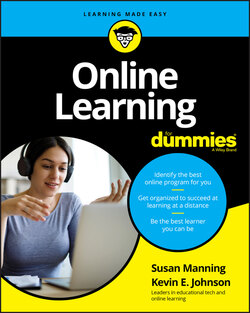Читать книгу Online Learning For Dummies - Susan Manning - Страница 53
People with disabilities
ОглавлениеTypically, disabilities come in two major fashions: physical challenges and difficulties processing information (learning disabilities).
If you’re physically challenged, whether by mobility concerns, deafness, or blindness, you may find the online environment to be more conducive to studying. Here are a few highlights:
Mobility: Persons who use wheelchairs or other assistive devices, such as crutches, canes, or walkers, can stay at home and study. No need to worry about whether sidewalks and building entrances are accessible.
Blindness: If you’re a person who is blind and you use a screen reader such as JAWS to complete your coursework online, you may have to ask for assistance with some areas of your coursework, but your campus should have staff who can help you work around any difficulties.
Deafness: Unless audio is a major portion of the course, such as in a language listening course, persons who are deaf can typically read their way through a class. When audio or video is part of the content for a course, alternative text versions are typically available.
Learners who have documented learning disabilities can also succeed in the online environment. Most institutions have a department that learners with accommodation needs can turn to. This department not only supports learners but also trains faculty and staff on how to make the necessary accommodations for all students to be successful in the online environment.
Disabilities are not limited to what others can see. Learners with anxiety disorders, for example, may need additional time for testing. That can be easily addressed online as long as you follow the same processes for requesting the accommodation.
Flip to Chapter 19 for more details on how people with physical and learning disabilities can handle online courses.
